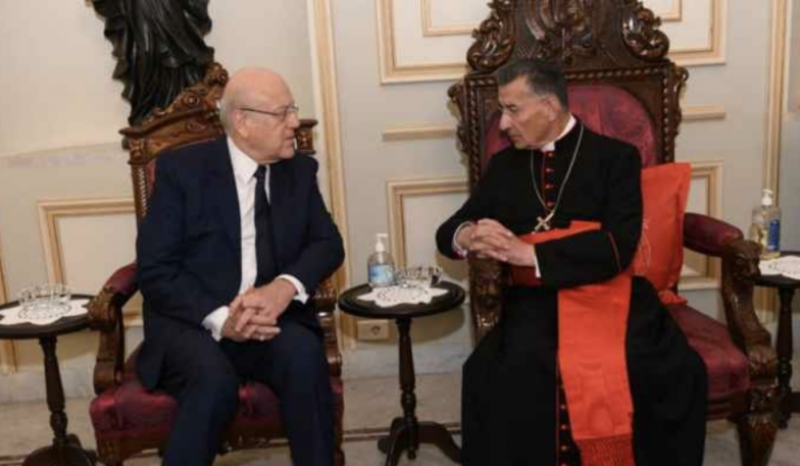
Outgoing Lebanese Prime Minister Najib Mikati and the head of the Maronite Church, Bechara Rai in Bkirki, on December 12, 2022. (Credit: National News Agency)
While the majority of Christian parties have been criticizing caretaker Prime Minister Najib Mikati for his handling of day-to-day current affairs during the presidential vacuum, tensions were further exacerbated by Saturday’s incident on the Qornat al-Sawda mountain in North Lebanon.
Two individuals — Haitham and Malek Tawk — from the predominantly-Christian town of Bsharri, North Lebanon, were tragically killed in an apparent conflict over water sources.
This long-standing dispute involves Bsharri and the majority-Sunni locality of Bqaa Safrin in the Dinnieh district.
Although Mikati responded swiftly by announcing the establishment of a commission to define the border between the two villages and their respective areas, he still faced criticism from several Christian figures.
They accused him of interfering with the judicial process, which was supposed to make a decision on the case.
‘Objection and one-upmanship’
Mikati eventually succumbed to pressure and suspended the committee just one day after he established it.
“In response to the objections and escalating tensions, the caretaker Prime Minister instructed the commission’s chairman and caretaker Interior Minister Bassam Mawlawi to postpone their meeting and suspend the committee’s activities,” said the government’s press office.
“We deeply regret the accusations leveled against us, particularly considering that the committee established by the head of government was purely technical, comprising judges and experts,” said Ali Darwish, a former MP and close advisor to the Mikati.
He further suggested that the committee could have included representatives from both sides.
In a prior attempt to resolve the water dispute, the previous government led by Saad Hariri formed a commission that included Sunni and Christian representatives. The initiative failed to yield a viable solution.
Incidentally, two MPs from Bsharri — Sethrida Tawk Geagea and William Tawk, who belong to two opposing political parties — issued a joint press release. Tawk Geagea is a member of the Lebanese Forces (LF), while her cousin has close ties to Sleiman Frangieh, the Christian leader of the North and Hezbollah-endorsed presidential candidate.
In their statement, the two MPs expressed their belief that, by establishing a commission to address the water dispute, Mikati was blatantly disregarding the principle of the separation of powers.
“The resolution of land disputes falls within the jurisdiction of the judiciary and should not be influenced by politics,” they emphasized in their statement, sparking a series of exchanges with the prime minister.
The LF has repeatedly criticized the cabinet meetings held after former President Michel Aoun’s departure from Baabda Palace and the onset of the presidential vacuum.
While they did not directly criticize Mikati as openly as Gebran Bassil’s Free Patriotic Movement (FPM), they labeled the meetings as “unconstitutional.”
“Our concern with Najib Mikati is not based on personal animosity or a structural issue,” LF spokesperson Charles Jabbour said. “We are merely responding to his positions.”
“The responsibility of resolving the conflict lies with the Land Court, not the prime minister,” he added.
The LF may have apprehensions that the current government, led by a Sunni leader from the North and backed by Hezbollah, may favor the residents of Beqaa Safrin in their decision-making process.
Full powers
Jabbour emphasized the importance of judicial intervention in resolving the dispute between the two areas and holding those responsible for the deaths of Haitham and Malek accountable.
He expresseed concern that, when a case is dismissed in Lebanon, there is often a political motive behind it.
The LF accused Hezbollah of arming and inciting youth from Beqaa Safrin to attack the residents of Bsharri, an accusation that the party vehemently denies.
In a press release from his office, Mikati stated that he requested caretaker Justice Minister Henri Khoury to expedite the handling of the related judicial cases by engaging with the Higher Judicial Council.
There have been no recent developments or breakthroughs in the investigation so far.
The LF is not alone in criticizing Mikati. The Maronite Church, which is also displeased with the cabinet meetings convened by Mikati, has reentered the fray.
“Those in authority do not have the right to dismantle the state and harm the people by undermining the political system and the Constitution,” said Maronite Patriarch Bechara al-Rai on Wednesday.
A source close to Rai told L’Orient-Le Jour on condition of anonymity that the prelate is particularly taken aback by Mikati assuming full powers.
“Not only has Mr. Mikati acted as if nothing has happened by governing the country amid the presidential vacuum and extending his influence beyond current affairs, but he has also monopolized the judiciary,” the source said.
In response, Mikati refuted any intentions of overstepping his authority.
“It is crucial to expedite the election of a president in order to put an end to the exploitation of the presidential vacuum for sectarian purposes,” he urged on Wednesday evening.
Under mounting pressure, particularly from Parliament Speaker Nabih Berri, to appoint a successor to central bank governor Riad Salameh, Mikati seems unlikely to receive approval from the Christian factions.
This article was originally published in French in L'Orient-Le Jour. Translation by Sahar Ghoussoub.